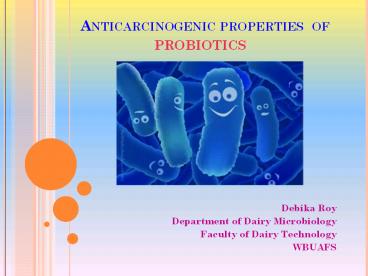anticarcinogenic properties of probiotics - PowerPoint PPT Presentation
Title:
anticarcinogenic properties of probiotics
Description:
health benefit of probiotics, how probiotics reduce the risk of colon cancer – PowerPoint PPT presentation
Number of Views:437
Title: anticarcinogenic properties of probiotics
1
Anticarcinogenic properties of probiotics
- Debika Roy
- Department of Dairy Microbiology
- Faculty of Dairy Technology
- WBUAFS
2
understanding the definitions
- Prebiotic - (greek - before life) a substance
(usually an oligosaccharide) that cannot be
digested but does promote the growth of
beneficial bacteria or probiotics. - Probiotic - (for life) a substance that contains
microorganisms or bacteria that are beneficial to
the host organism. - Symbiotic - (plus life) a substance containing
both a prebiotic and probiotic.
3
What are Probiotics
- Probiotic organisms are live microorganisms
thought to be beneficial to the host organism.
According to the currently adopted definition by
FAO/WHO, probiotics are "Live microorganisms
which when administered in adequate amounts
confer a health benefit on the host". Lactic acid
bacteria (LAB) and bifidobacteria are the most
common types of microbes used as probiotics but
certain yeasts and bacilli may also be used.
4
Probiotics microorganisms
- Probiotics consist specific microbial cultures
and/ or ingredients that stimulate gut micro
flora capable of modifying the gastrointestinal
environment which keeps the host healthy - Lactic acid producing bacteria
- Lactobacilli and Bifidobacterium
- Yeast
- Others
- Commercially available products may contain pure
and combined cultures of - Lactobacillus
- Bifidobacterium
- Streptococcus
- Pedicococcus
- Aspergillus
- Bacillus
5
Probiotics health benefits
Elimination of lactose intolerance Anti-diarrheal
Immunomodulatory Antidiabetic Anticarcinogenic
Hypocholesterolemic Antihypertensive
6
Probiotics and Cancer
- Colorectal cancer represents a major public
health problem accounting for over 1 million
cases and about half a million deaths worldwide .
Survival from colon cancer at 5 years has been
found to vary demographically and estimated to be
65 in North America, 54 in Western Europe, 34
in Eastern Europe, and 30 in India. - Although chemotherapy and radiotherapy have been
applied as the surgical adjuvant treatments of
colon cancer, they vary in success rates for
local recurrence, disease-free survival, and
overall survival . In addition, these treatments
may present some side effects such as an
increased risk for infections, hair loss,
fatigue, vomiting, diarrhea, and bloody stools.
7
Probiotics and Cancer
- Diet interventions and natural bioactive
supplements have now been extensively studied to
reduce the risks of colon cancer, as a cause of
prevention instead of cure. Postulated mechanisms
include reduction in the activity of several
cancer causing bacteria, desmutagenic and
anticarcinogenic properties. - Prebiotics, being indigestible, have been
associated with improved bowel functions and
metabolisms of the distal colon, including a
reduced risk of colon cancer.
8
Probiotics and Cancer
- Enzymes (Glycosidase, B- glucuronidase ,
azoreductase , and nitroreductase ) of the
intestinal flora convert the precarcinogens to
active carcinogens - Probiotics reduce
- Faecal concentrations of enzymes
- Secondary bile salts
- Reduce absorption of harmful mutagens that may
contribute to colon carcinogenesis.
9
Some proposed mechanisms
- Several mechanisms have been proposed as to how
lactic acid bacteria may inhibit colon cancer - Enhancing the hosts immune response
- Altering the metabolic activity of the
intestinal microflora - Binding and degrading carcinogens
- Producing antimutagenic compounds
- Altering the physiochemical conditions in the
colon
10
Research on cancer still
experimental
The strongest evidence for the anti-cancer
effects of probiotics comes from animal studies
evidence from human studies (epidemiology and
experimental) is still limited. An important goal
for the future should be carefully designed human
clinical trials to corroborate the wealth of
experimental studies.
11
(No Transcript)































